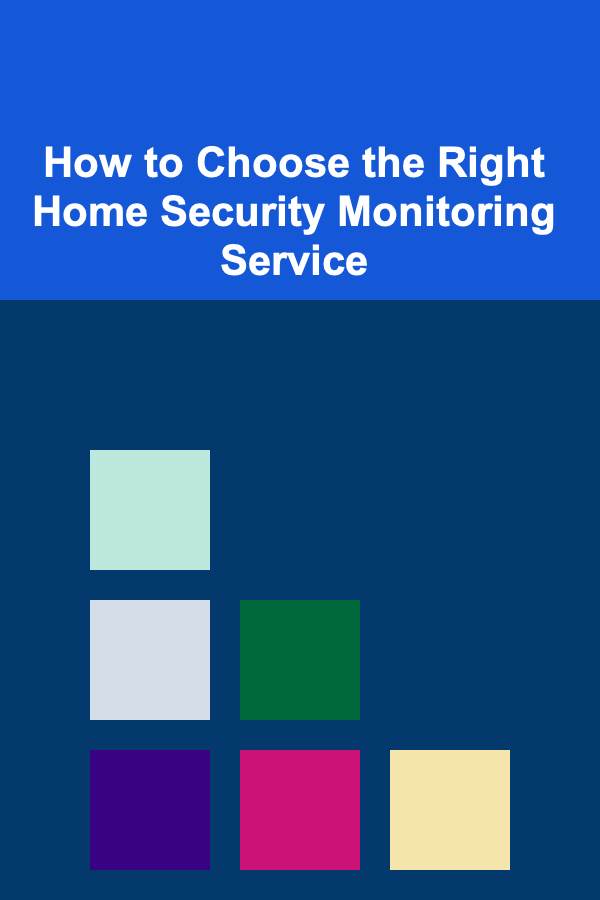
How to Choose the Right Home Security Monitoring Service
ebook include PDF & Audio bundle (Micro Guide)
$12.99$9.99
Limited Time Offer! Order within the next:

Choosing the right home security monitoring service is a crucial decision for homeowners who want to ensure the safety and protection of their family, property, and possessions. With an increasing number of options on the market, the process of selecting the best service can be overwhelming. Security monitoring is an investment in peace of mind, but with various pricing plans, features, and technologies available, understanding how to evaluate these services is essential for making an informed choice.
This article will guide you through the critical factors to consider when choosing a home security monitoring service. From the types of monitoring to customer service, contract terms, and price points, we'll explore everything you need to know before committing to a provider. By the end of this guide, you should feel equipped to make the right choice for your home's security needs.
Understanding Security Monitoring: What Is It and Why Is It Important?
Security monitoring refers to a system where a company or a third-party provider keeps an eye on your home's security system, alerting authorities in the event of an emergency. It involves the use of sensors, cameras, and alarm systems that send signals to a monitoring center whenever a potential threat is detected---be it a break-in, fire, or medical emergency. There are two primary types of security monitoring services:
a. Professional Monitoring
Professional monitoring means that a dedicated team is responsible for overseeing your home's security system. These services are typically offered by well-established security companies like ADT, Vivint, or Frontpoint. In the event of an alarm trigger, the monitoring center will verify the threat and contact the appropriate authorities---whether it's the police, fire department, or emergency medical services.
b. Self-Monitoring
With self-monitoring, you receive alerts directly to your smartphone or other devices. You're responsible for responding to those alerts and deciding whether you need to take further action, such as contacting law enforcement or other authorities. This type of service is often offered by DIY security systems, such as Ring or SimpliSafe, where the homeowner has more control over the system but isn't reliant on a third-party monitoring service.
Both options have their advantages, but the peace of mind that comes with professional monitoring is often why many people opt for this service. However, it's essential to understand your needs and the level of control you want over your security system before making a decision.
Assessing the Types of Home Security Systems
When choosing a home security monitoring service, it's vital to evaluate the type of security system that works best for you. Different security systems have varying capabilities and features, which may impact the overall service experience. Some systems come with additional features like video surveillance, smart home integration, or fire and carbon monoxide detection.
a. Wired vs. Wireless Systems
- Wired Systems: These systems are directly connected to your home's electrical grid, with sensors and components installed through the walls. They tend to be more stable and less vulnerable to interference from outside signals but are more complex and expensive to install.
- Wireless Systems: Wireless systems are easier to install and more flexible, as they don't require extensive drilling or wiring. They use cellular signals to transmit data and are often offered with DIY installations. While easier to manage, wireless systems may be more prone to technical issues, such as interference or connectivity problems.
Each type has its pros and cons, but many modern monitoring services offer wireless systems with advanced features like remote control through smartphone apps.
b. Monitoring Features
The monitoring service you select will need to match the features of your security system. Common features that you may want to consider include:
- Video Surveillance: Many systems now include cameras that allow you to view your home in real time from your smartphone or computer. Video surveillance can be helpful in both preventing crime and providing valuable evidence in case of an emergency.
- Fire and Carbon Monoxide Detection: Some home monitoring systems are integrated with smoke detectors or carbon monoxide detectors, ensuring that you're alerted to dangers beyond burglaries.
- Smart Home Integration: The best monitoring systems can often be integrated with other smart devices in your home, like smart thermostats, lighting systems, and locks. This provides more convenience and can improve the overall safety of your home.
- Environmental Monitoring: In addition to burglary and fire detection, some services offer environmental monitoring, such as water leak detectors or temperature sensors, which can notify you of potential flooding or temperature extremes.
When evaluating providers, ensure their monitoring service is compatible with your home's technology and meets your specific security needs.
Understanding Pricing Models and Contracts
Pricing is one of the most significant factors in choosing a security monitoring service. Most security companies have a tiered pricing structure based on the level of monitoring and services you require. While cost is an essential factor, it's also crucial to consider the long-term value of the service. Often, cheaper options may have hidden fees or may not offer the level of service that provides peace of mind.
a. Initial Setup Fees
Many home security services have installation fees or setup costs, which can range from $100 to $200 or more, depending on the complexity of the system. Some companies offer free or discounted installation for new customers, but this may come with a higher monthly monitoring fee or require you to commit to a long-term contract.
b. Monthly Monitoring Fees
This is the ongoing cost associated with keeping your system monitored by a professional service. Prices for professional monitoring can range from $20 to $60 per month or more, depending on the type of monitoring, level of service, and any added features. It's essential to consider how much you're willing to pay each month and ensure the service provides the value you expect.
- Basic Monitoring: Includes 24/7 monitoring with alerts for break-ins or other emergencies.
- Premium Monitoring: Includes added features, such as video surveillance, remote access, and integration with other smart devices.
c. Contract Length
Some monitoring services require customers to sign long-term contracts, while others offer month-to-month options. Contract lengths typically range from 12 months to 36 months, with some companies offering incentives like discounted equipment or installation fees for committing to longer contracts.
Before committing to a long-term contract, carefully review the terms and conditions. Ensure that there's flexibility in case your needs change or if you decide to move. Additionally, check if there are penalties for early termination and if the monitoring service offers an easy cancellation process.
d. Hidden Fees
When evaluating the overall cost, make sure to ask the service provider about any hidden fees that might be added to your bill. These can include cancellation fees, equipment replacement fees, or fees for additional services like video storage.
Customer Service and Reliability
A key factor in selecting a home security monitoring service is the reliability and quality of customer service. After all, in the event of an emergency, you'll want to know that you can trust your monitoring service to act quickly and effectively.
a. Response Time
A good monitoring service should offer a quick response time when an alarm is triggered. Ideally, they should be able to verify the alarm and alert the authorities within a matter of seconds or minutes. When researching providers, consider reading customer reviews and asking about their average response times.
b. Customer Support Availability
Check whether the service offers 24/7 customer support. In case your system malfunctions or if you have questions or concerns, you'll want to ensure you can get in touch with customer support at any time of day or night. Test their customer support by calling their helpline and assessing the responsiveness and professionalism of their staff.
c. Reputation and Reviews
Before selecting a monitoring service, do thorough research to check customer reviews and ratings. Look for reviews on independent websites, not just the company's site, as these tend to be more impartial. Pay attention to complaints about false alarms, poor customer service, or long wait times.
The Importance of Scalability and Flexibility
As your home or family grows, your security needs may evolve as well. The security monitoring service you choose should be scalable and flexible enough to accommodate your changing needs.
a. Expanding Your System
If you plan to add more security devices, such as additional cameras, sensors, or smart devices, make sure the service offers easy expansion options. Some services allow you to add components without upgrading your plan, while others may require a new contract or higher pricing tiers.
b. Integration with Other Systems
Smart home technology is evolving rapidly, and many homeowners now want to integrate their security systems with other home automation systems. Look for a service that works seamlessly with smart home platforms like Amazon Alexa, Google Assistant, or Apple HomeKit. This will allow you to control your security system using voice commands or a mobile app, improving both convenience and security.
Conclusion
Choosing the right home security monitoring service is a vital step in securing your home and protecting your loved ones. By considering the factors outlined in this guide---such as the types of monitoring services, system features, pricing, customer service, and scalability---you can make an informed decision that suits your needs and budget.
Take the time to thoroughly research different providers, ask questions, and compare their offerings. The right home security monitoring service will not only provide peace of mind but will also offer the reliability and flexibility you need as your security needs evolve.
Remember, security is an investment in your family's safety, and choosing the right service will ensure that your home remains a safe haven for years to come.
Reading More From Our Other Websites
- [Personal Investment 101] How to Invest in Foreign Currencies and Forex Trading
- [Home Pet Care 101] How to Keep Your Home Calm During Pet Storm Anxiety
- [Organization Tip 101] How to Create a Simple Filing System for Important Documents
- [Biking 101] Bike Storage Hacks: Creative Ways to Store Your Bike at Home
- [Personal Care Tips 101] How to Master a Flawless Makeup Removal Routine for Healthier Skin
- [Home Holiday Decoration 101] How to Create a Stunning Holiday Entryway to Greet Guests
- [Home Pet Care 101] How to Prevent Fleas and Ticks on Your Pet and in Your Home
- [Scrapbooking Tip 101] Best Scrapbooking Ideas for Celebrating Baby Milestones & First Years
- [Personal Care Tips 101] How to Layer Different Mascara Formulas for Maximum Impact
- [Personal Investment 101] How to Analyze a Company Before Investing in Its Stock

Creating Passive Income Streams with Deep Learning Models
Read More
Fun and Affordable DIY Pet Toys and Accessories You Can Make at Home
Read More
How to Keep Your Entryway Clean and Tidy Daily
Read More
How to Use Mind Mapping for Paperwork Organization
Read More
How to Utilize Vertical Space for Workspace Efficiency
Read More
How to Prepare for Martian Colonization
Read MoreOther Products

Creating Passive Income Streams with Deep Learning Models
Read More
Fun and Affordable DIY Pet Toys and Accessories You Can Make at Home
Read More
How to Keep Your Entryway Clean and Tidy Daily
Read More
How to Use Mind Mapping for Paperwork Organization
Read More
How to Utilize Vertical Space for Workspace Efficiency
Read More